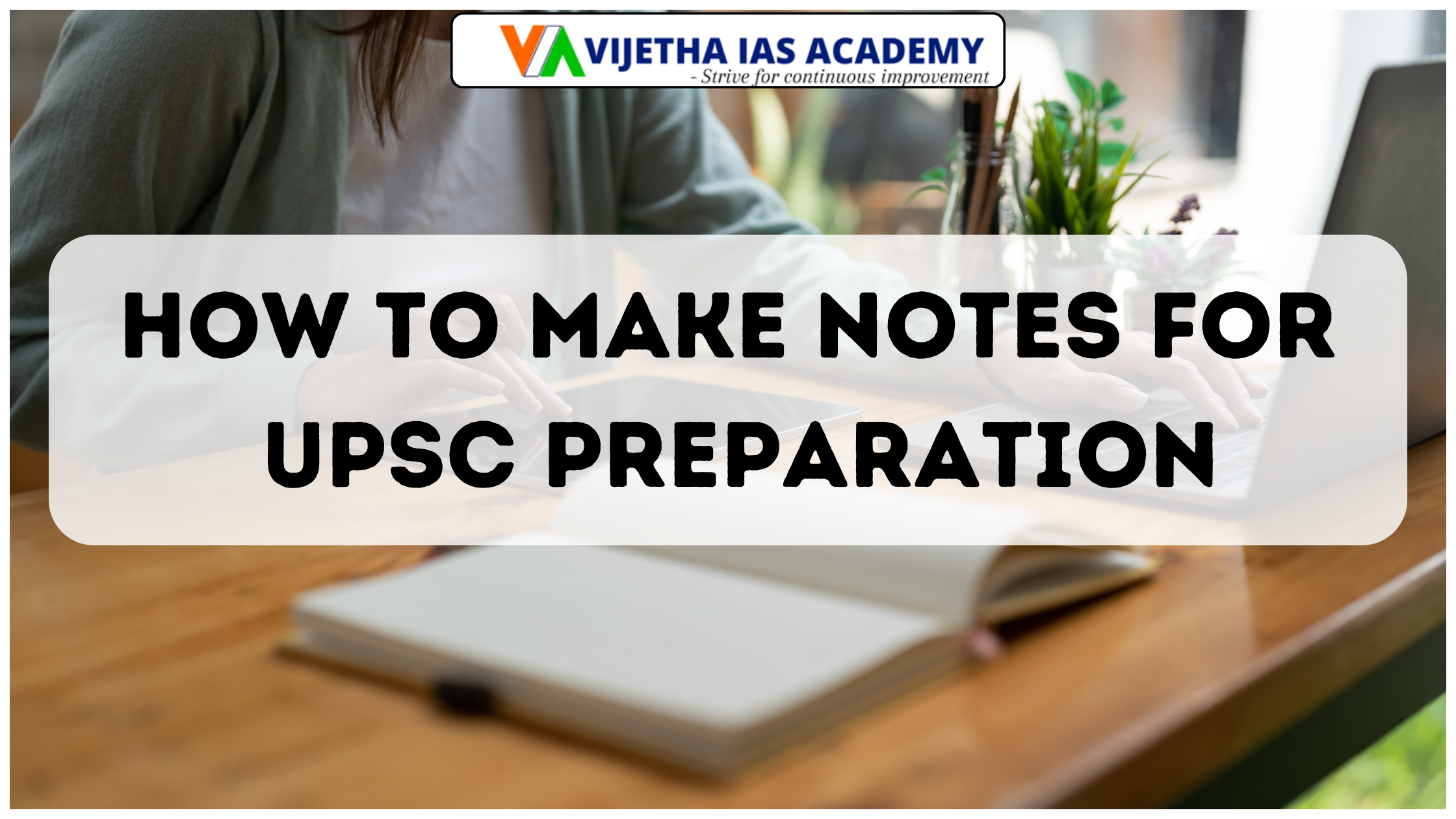
How to Make Notes for UPSC Preparation
Preparing for the UPSC Civil Services Examination is a formidable challenge that requires meticulous planning, dedicated study, and effective note-making strategies. Notes are essential tools for revision and retaining information. In this blog post, we will explore how to make notes for UPSC preparation, ensuring that your study material is concise, organized, and useful. We will also highlight the support and guidance provided by Vijetha IAS Academy and the expertise of Kishore sir Anthropology to aid you in this process.
Why Note-Making is Crucial for UPSC Preparation
1. Enhances Retention
Writing notes helps in better retention of information. When you write down important points, you are more likely to remember them compared to just reading.
2. Facilitates Quick Revision
Concise notes make it easier to revise vast amounts of information quickly. During the last stages of preparation, well-organized notes save time and reduce stress.
3. Helps in Structuring Answers
Notes help in organizing your thoughts and structuring your answers effectively. This is particularly important for the Mains examination, where answer writing skills are crucial.
4. Consolidates Learning
Making notes helps in consolidating your learning from various sources, ensuring that you have a comprehensive understanding of the topics.
Tips for Effective Note-Making
1. Start Early
Begin making notes from the start of your preparation. This will help you build a strong foundation and avoid last-minute rushes.
2. Keep It Concise
Your notes should be concise and to the point. Avoid writing long paragraphs. Use bullet points, headings, and subheadings to organize information.
3. Use Your Own Words
Writing in your own words helps in better understanding and retention. Avoid copying directly from books or sources.
4. Organize by Topics
Organize your notes topic-wise, following the UPSC syllabus. This makes it easier to find and revise information.
5. Use Multiple Sources
Consolidate information from multiple sources, including textbooks, reference books, newspapers, and online resources. This ensures that your notes are comprehensive.
6. Incorporate Current Affairs
Integrate current affairs into your notes, especially for dynamic subjects like Polity, Economy, and Environment. This helps in relating static information with current events.
7. Regularly Update Your Notes
Keep your notes updated with new information and developments. This is particularly important for current affairs and dynamic subjects.
8. Use Diagrams and Charts
Visual aids like diagrams, flowcharts, and mind maps can make your notes more engaging and easier to understand.
9. Revise Regularly
Regular revision is crucial. Set aside time each week to revise your notes to ensure that the information stays fresh in your mind.
How to Make Notes for Different Subjects
Polity
- Use Standard Books: Refer to books like Laxmikanth for Indian Polity.
- Current Affairs: Integrate news about government policies, amendments, and court judgments.
- Flowcharts: Use flowcharts to explain processes like the passage of a bill.
History
- Chronological Order: Organize notes in chronological order for easy understanding.
- Key Events and Personalities: Highlight key events, dates, and personalities.
- Maps and Diagrams: Use maps for historical battles and diagrams for timelines.
Geography
- Diagrams and Maps: Use diagrams and maps to explain geographical phenomena.
- Case Studies: Include case studies to illustrate concepts.
- Concise Points: Write concise points for physical, human, and economic geography.
Economy
- Concepts and Definitions: Clearly define key concepts and terms.
- Current Affairs: Integrate current economic developments and government schemes.
- Data and Statistics: Use relevant data and statistics to support your notes.
Environment
- Schemes and Policies: Note down important environmental schemes and policies.
- Current Affairs: Integrate current environmental issues and case studies.
- Diagrams: Use diagrams to explain ecological processes and cycles.
Science and Technology
- Latest Developments: Keep notes updated with the latest developments in science and technology.
- Diagrams: Use diagrams to explain scientific concepts and processes.
- Applications: Note down the practical applications of scientific advancements.
Ethics
- Key Concepts: Define key ethical concepts and principles.
- Case Studies: Include case studies to illustrate ethical dilemmas and their resolutions.
- Quotes and Examples: Use quotes from philosophers and leaders to support your notes.
How Vijetha IAS Academy Can Help
Vijetha IAS Academy provides comprehensive support and guidance for UPSC aspirants, emphasizing effective note-making strategies. Here’s how we can assist you:
- Expert Faculty: Our experienced faculty, including Kishore sir Anthropology, provide personalized guidance on making effective notes.
- Structured Study Material: We offer meticulously curated study material that covers the entire syllabus, making note-making easier.
- Regular Assessments: Our regular tests and assessments help you track your progress and refine your notes accordingly.
- Current Affairs Updates: We provide daily and monthly current affairs updates, ensuring that your notes are always up-to-date.
- Workshops and Seminars: We conduct workshops and seminars on effective note-making techniques, helping you improve your skills.
Practical Tips from Kishore Sir Anthropology
Kishore sir Anthropology shares valuable insights on making effective notes for UPSC preparation:
- Start with the Basics: Ensure that your notes cover the basic concepts before moving on to advanced topics.
- Link Static and Dynamic: Link static information with current affairs to provide a comprehensive understanding.
- Be Consistent: Consistency is key. Make notes regularly and revise them frequently.
- Use Highlighters: Use highlighters to emphasize important points and make your notes visually appealing.
- Stay Organized: Keep your notes well-organized and easily accessible for quick revisions.
Conclusion
Effective note-making is a crucial component of UPSC preparation, enhancing retention, facilitating quick revision, and aiding in structuring answers. By starting early, keeping notes concise, using multiple sources, and regularly updating and revising them, you can ensure that your notes are a valuable tool in your preparation.
With the comprehensive support and guidance provided by Vijetha IAS Academy and the expertise of Kishore sir Anthropology, you can master the art of note-making and significantly improve your chances of success in the UPSC examination.
